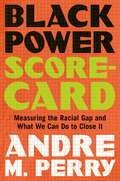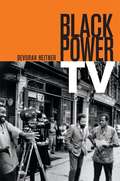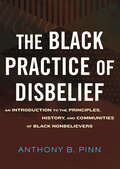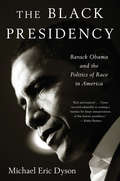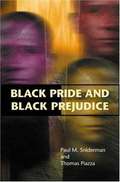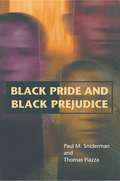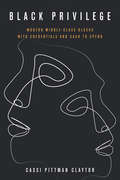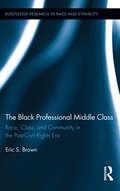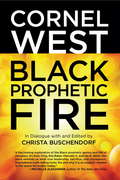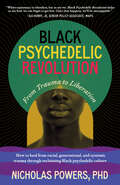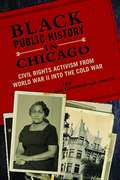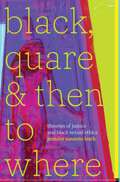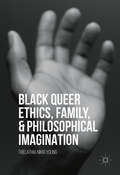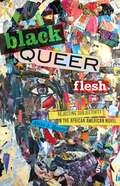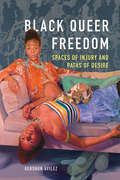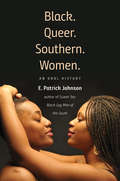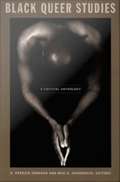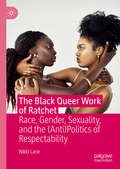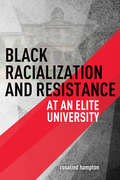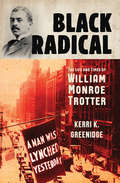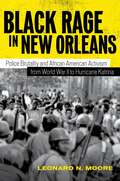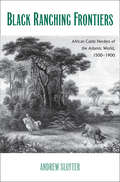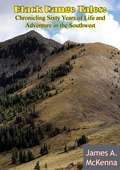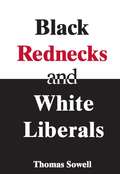- Table View
- List View
Black Power Scorecard: Measuring the Racial Gap and What We Can Do to Close It
by Andre M. PerryFrom the creator of “a unified field theory of racism” (NPR’s Planet Money), a dollars-and-cents reckoning of the state of Black America and a new framework to close the power gap Historically, Black Americans’ quest for power has been understood as an attempt to gain equal protections under the law. But power in America requires more than basic democratic freedoms. It is inextricably linked with economic influence and ownership—of one’s self, home, business, and creations. Andre M. Perry draws on extensive research and analysis to quantify how much power Black Americans actually have. Ranging from property, business, and wealth to education, health, and social mobility, Black Power Scorecard moves across the country, evaluating people’s ability to set the rules of the game and calculating how that translates into the ultimate means of power—life itself, and the longevity of Black communities. Along the way, Perry identifies woefully overlooked areas of investment that could close the racial gap and benefit everyone. An expansive take on power supported by documentation and data, Black Power Scorecard is a fresh contribution to the country’s reckoning with structural inequality, one that offers a new approach to redressing it.
Black Power TV
by Devorah HeitnerIn Black Power TV, Devorah Heitner chronicles the emergence of Black public affairs television starting in 1968. She examines two local shows, New York's Inside Bedford-Stuyvesant and Boston's Say Brother, and the national programs Soul! and Black Journal. These shows offered viewers radical and innovative programming: the introspections of a Black police officer in Harlem, African American high school students discussing visionary alternatives to the curriculum, and Miriam Makeba comparing race relations in the United States to apartheid in South Africa. While Inside Bedford-Stuyvesant and Say Brother originated from a desire to contain Black discontent during a period of urban uprisings and racial conflict, these shows were re-envisioned by their African American producers as venues for expressing Black critiques of mainstream discourse, disseminating Black culture, and modeling Black empowerment. At the national level, Soul! and Black Journal allowed for the imagining of a Black nation and a distinctly African American consciousness, and they played an influential role in the rise of the Black Arts Movement. Black Power TV reveals how regulatory, activist, and textual histories are interconnected and how Black public affairs television redefined African American representations in ways that continue to reverberate today.
The Black Practice of Disbelief: An Introduction to the Principles, History, and Communities of Black Nonbelievers
by Anthony PinnA short introduction to Black Humanism: its history, its present, and the rich cultural sensibilities that infuse itIn the United States, to be a Black American is to be a Black Christian. And there&’s something to this assumption in that the vast majority of African Americans are Christian. However, in recent years a growing number of African Americans have said they claim no particular religious affiliation—they are Black "nones." And of these Black "nones," the most public and vocal are those who claim to be humanists.What does it mean to be a Black humanist? What do Black humanist believe, and what do they do? This slim volume answers these questions. Animated by six central principles, and discussed in terms of its history, practices, formations, and community rituals, this book argues that Black humanism can be understood as a religious movement. Pinn makes a distinction between theism and religion—which is simply a tool for examining, naming, and finding the meaning in human experience. Black humanism, based on this definition isn&’t theistic but it is a religious system used to explore human experience and foster life meaning. It infuses humanism with rich cultural sensibilities drawn from Black experience. As shown in these pages, thinking about Black humanism this way frees readers from making unfounded assumptions and enables them to better appreciate the secular &“beliefs,&” ritual structures, and community formation constituted by Black humanists.
The Black Presidency: Barack Obama and the Politics of Race in America
by Michael Eric DysonA provocative and lively examination of the meaning of America's first black presidency, by the New York Times-bestselling author of Tears We Cannot Stop. Michael Eric Dyson explores the powerful, surprising way the politics of race have shaped Barack Obama&’s identity and groundbreaking presidency. How has President Obama dealt publicly with race—as the national traumas of Tamir Rice, Trayvon Martin, Michael Brown, Eric Garner, Freddie Gray, and Walter Scott have played out during his tenure? What can we learn from Obama's major race speeches about his approach to racial conflict and the black criticism it provokes? Dyson explores whether Obama&’s use of his own biracialism as a radiant symbol has been driven by the president&’s desire to avoid a painful moral reckoning on race. And he sheds light on identity issues within the black power structure, telling the fascinating story of how Obama has spurned traditional black power brokers, significantly reducing their leverage. President Obama&’s own voice—from an Oval Office interview granted to Dyson for this book—along with those of Eric Holder, Al Sharpton, Jesse Jackson, Andrew Young, and Maxine Waters, among others, add unique depth to this profound tour of the nation&’s first black presidency. &“Dyson proves…that he is without peer when it comes to contextualizing race in twenty-first-century America… A must-read for anyone who wants to better understand America&’s racial past, present, and future.&”—Gilbert King, author of the Pulitzer Prize–winning Devil in the Grove&“No one understands the American dilemma of race—and Barack Obama&’s confounding and yet wondrous grappling with it—better than [Dyson.]&”—Douglas Blackmon, author of the Pulitzer Prize–winning Slavery by Another Name
Black pride and black prejudice
by Paul M. Sniderman Thomas PiazzaDo "black pride" and "black prejudice" come hand in hand? Does taking pride in being black encourage the rejection of a common bond with other Americans?<P><P> In this groundbreaking study, two leading social scientists mount a challenge to those who would answer "yes." Paul Sniderman and Thomas Piazza probe these questions in the only way possible--asking black Americans themselves to share their thoughts about each other, America, and other Americans.<P> Writing in a strikingly transparent style, they open a new window on the ideas and values of real individuals who make up the black community in America today. Contrary to the rhetoric of some black leaders, Sniderman and Piazza show that African Americans overwhelmingly reject racial separatism and embrace a common framework, culture, and identity with other Americans.<P> Although the authors find that levels of anti-Semitism are notably higher among black Americans than among white Americans, they demonstrate that taking pride in being black does not encourage blacks to be more suspicious or intolerant of others who are not black. The higher levels of anti-Semitism are instead associated with a gallery of oversimplified and accusatory ideas, including a popularized Afrocentrism and charges of vast conspiracies, that have won substantial support in the black community.<P> Readers of this book will come away with an understanding of how African Americans, while insistent on winning racial justice, are deeply committed to the values of the American ethos and their identity as Americans.
Black Pride and Black Prejudice
by Paul M. Sniderman Thomas PiazzaDo "black pride" and "black prejudice" come hand in hand? Does taking pride in being black encourage the rejection of a common bond with other Americans? In this groundbreaking study, two leading social scientists mount a challenge to those who would answer "yes." Paul Sniderman and Thomas Piazza probe these questions in the only way possible--asking black Americans themselves to share their thoughts about each other, America, and other Americans. Writing in a strikingly transparent style, they open a new window on the ideas and values of real individuals who make up the black community in America today. Contrary to the rhetoric of some black leaders, Sniderman and Piazza show that African Americans overwhelmingly reject racial separatism and embrace a common framework, culture, and identity with other Americans. Although the authors find that levels of anti-Semitism are notably higher among black Americans than among white Americans, they demonstrate that taking pride in being black does not encourage blacks to be more suspicious or intolerant of others who are not black. The higher levels of anti-Semitism are instead associated with a gallery of oversimplified and accusatory ideas, including a popularized Afrocentrism and charges of vast conspiracies, that have won substantial support in the black community. Readers of this book will come away with an understanding of how African Americans, while insistent on winning racial justice, are deeply committed to the values of the American ethos and their identity as Americans.
Black Privilege: Modern Middle-Class Blacks with Credentials and Cash to Spend (Culture and Economic Life)
by Cassi Pittman ClaytorIn their own words, the subjects of this book present a rich portrait of the modern black middle-class, examining how cultural consumption is a critical tool for enjoying material comforts as well as challenging racism. New York City has the largest population of black Americans out of any metropolitan area in the United States. It is home to a steadily rising number of socio-economically privileged blacks. In Black Privilege Cassi Pittman Claytor examines how this economically advantaged group experiences privilege, having credentials that grant them access to elite spaces and resources with which they can purchase luxuries, while still confronting persistent anti-black bias and racial stigma. Drawing on the everyday experiences of black middle-class individuals, Pittman Claytor offers vivid accounts of their consumer experiences and cultural flexibility in the places where they live, work, and play. Whether it is the majority white Wall Street firm where they're employed, or the majority black Baptist church where they worship, questions of class and racial identity are equally on their minds. They navigate divergent social worlds that demand, at times, middle-class sensibilities, pedigree, and cultural acumen; and at other times pride in and connection with other blacks. Rich qualitative data and original analysis help account for this special kind of privilege and the entitlements it affords—materially in terms of the things they consume, as well as symbolically, as they strive to be unapologetically black in a society where a racial consumer hierarchy prevails.
The Black Professional Middle Class: Race, Class, and Community in the Post-Civil Rights Era (Routledge Research in Race and Ethnicity #8)
by Eric S. BrownThrough an in-depth case study of the black professional middle class in Oakland, this book provides an analysis of the experiences of black professionals in the workplace, community, and local politics. Brown shows how overlapping dynamics of class formation and racial formation have produced historically powerful processes of what he terms "racialized class formation," resulting in a distinct (and internally differentiated) entity, not merely a subset of a larger professional middle class.
Black Prophetic Fire
by Cornel West Christa BuschendorfAn unflinching look at nineteenth- and twentieth-century African American leaders and their visionary legacies. In an accessible, conversational format, Cornel West, with distinguished scholar Christa Buschendorf, provides a fresh perspective on six revolutionary African American leaders: Frederick Douglass, W. E. B. Du Bois, Martin Luther King Jr., Ella Baker, Malcolm X, and Ida B. Wells. In dialogue with Buschendorf, West examines the impact of these men and women on their own eras and across the decades. He not only rediscovers the integrity and commitment within these passionate advocates but also their fault lines. West, in these illuminating conversations with the German scholar and thinker Christa Buschendorf, describes Douglass as a complex man who is both "the towering Black freedom fighter of the nineteenth century" and a product of his time who lost sight of the fight for civil rights after the emancipation. He calls Du Bois "undeniably the most important Black intellectual of the twentieth century" and explores the more radical aspects of his thinking in order to understand his uncompromising critique of the United States, which has been omitted from the American collective memory. West argues that our selective memory has sanitized and even "Santaclausified" Martin Luther King Jr., rendering him less radical, and has marginalized Ella Baker, who embodies the grassroots organizing of the civil rights movement. The controversial Malcolm X, who is often seen as a proponent of reverse racism, hatred, and violence, has been demonized in a false opposition with King, while the appeal of his rhetoric and sincerity to students has been sidelined. Ida B. Wells, West argues, shares Malcolm X's radical spirit and fearless speech, but has "often become the victim of public amnesia." By providing new insights that humanize all of these well-known figures, in the engrossing dialogue with Buschendorf, and in his insightful introduction and powerful closing essay, Cornel West takes an important step in rekindling the Black prophetic fire so essential in the age of Obama.
Black Psychedelic Revolution: From Trauma to Liberation--How to heal from racial, generational, and systemic trauma through reclaiming Black psychedelic culture
by Nicholas PowersHow psychedelics can heal historical, intergenerational, and racialized trauma—an Afrofuturistic take on Black psychedelia toward joy and liberationThe mainstream has long viewed psychedelic medicine as the purview of people with privilege: money to burn, time to trip, and the social safety to experiment. Though psychedelics have deep roots in Black and Indigenous cultures, Western psychedelic spaces have historically excluded People of Color—but the radical healing of psilocybin, MDMA, and ketamine aren&’t just for a rarefied elite. And they&’re definitely not just for white people.Combined with quality therapy, safe and equitable access, and full-scale societal healing, psychedelics are a shortcut to liberation, dignity, and power—the &“Promised Land&” as envisioned by Martin Luther King, Jr.Risqué? Sure. But it&’s true.In Black Psychedelic Revolution, Dr. Nicholas Powers charts how psychedelics can heal racial pain passed on through generations. He shows how this medicine unlocks a return to one&’s self, facilitating an embodied experience of safety, peace, and being-here-now otherwise disrupted by whiteness—and he explores how psychedelics can catalyze individual wellness even as they transcend it. Drugs taken with therapy can heal. But drugs taken with a social movement can heal a nation.Powers unpacks how the Drug War, racist policing, mass incarceration, and community gatekeeping intersect to sideline POC—specifically Black people—from the psychedelic movement. He asserts the need for a full-stop reclamation and revolution: one that eschews psychedelic exceptionalism, breaks down raced and classed constructs of &“good&” vs. &“bad&” drugs, realizes healing, and lives into a free, strong, and independent Blackness.
Black Public History in Chicago: Civil Rights Activism from World War II into the Cold War (New Black Studies Series)
by Ian Rocksborough-SmithIn civil-rights-era Chicago, a dedicated group of black activists, educators, and organizations employed black public history as more than cultural activism. Their work and vision energized a black public history movement that promoted political progress in the crucial time between World War II and the onset of the Cold War. Ian Rocksborough-Smith's meticulous research and adept storytelling provide the first in-depth look at how these committed individuals leveraged Chicago's black public history. Their goal: to engage with the struggle for racial equality. Rocksborough-Smith shows teachers working to advance curriculum reform in public schools, while well-known activists Margaret and Charles Burroughs pushed for greater recognition of black history by founding the DuSable Museum of African American History. Organizations like the Afro-American Heritage Association, meanwhile, used black public history work to connect radical politics and nationalism. Together, these people and their projects advanced important ideas about race, citizenship, education, and intellectual labor that paralleled the shifting terrain of mid-twentieth century civil rights.
Black Pulp: Genre Fiction in the Shadow of Jim Crow
by Brooks E. HefnerA deep dive into mid-century African American newspapers, exploring how Black pulp fiction reassembled genre formulas in the service of racial justice In recent years, Jordan Peele&’s Get Out, Marvel&’s Black Panther, and HBO&’s Watchmen have been lauded for the innovative ways they repurpose genre conventions to criticize white supremacy, celebrate Black resistance, and imagine a more racially just world—important progressive messages widely spread precisely because they are packaged in popular genres. But it turns out, such generic retooling for antiracist purposes is nothing new. As Brooks E. Hefner&’s Black Pulp shows, this tradition of antiracist genre revision begins even earlier than recent studies of Black superhero comics of the 1960s have revealed. Hefner traces it back to a phenomenon that began in the 1920s, to serialized (and sometimes syndicated) genre stories written by Black authors in Black newspapers with large circulations among middle- and working-class Black readers. From the pages of the Pittsburgh Courier and the Baltimore Afro-American, Hefner recovers a rich archive of African American genre fiction from the 1920s through the mid-1950s—spanning everything from romance, hero-adventure, and crime stories to westerns and science fiction. Reading these stories, Hefner explores how their authors deployed, critiqued, and reassembled genre formulas—and the pleasures they offer to readers—in the service of racial justice: to criticize Jim Crow segregation, racial capitalism, and the sexual exploitation of Black women; to imagine successful interracial romance and collective sociopolitical progress; and to cheer Black agency, even retributive violence in the face of white supremacy. These popular stories differ significantly from contemporaneous, now-canonized African American protest novels that tend to represent Jim Crow America as a deterministic machine and its Black inhabitants as doomed victims. Widely consumed but since forgotten, these genre stories—and Hefner&’s incisive analysis of them—offer a more vibrant understanding of African American literary history.
Black, Quare, and Then to Where: Theories of Justice and Black Sexual Ethics (Religious Cultures of African and African Diaspora People)
by jennifer susanne leathIn Black, Quare, and Then to Where jennifer susanne leath explores the relationship between Afrodiasporic theories of justice and Black sexual ethics through a womanist engagement with Maât the ancient Egyptian deity of justice and truth. Maât took into account the historical and cultural context of each human’s life, thus encompassing nuances of politics, race, gender, and sexuality. Arguing that Maât should serve as a foundation for reconfiguring Black sexual ethics, leath applies ancient Egyptian moral codes to quare ethics of the erotic, expanding what relationships and democratic practices might look like from a contemporary Maâtian perspective. She also draws on Pan-Africanism and examines the work of Alice Walker, E. Patrick Johnson, Cheikh Anta Diop, Sylvia Wynter, Sun Ra, and others. She shows that together these thinkers and traditions inform and expand the possibilities of Maâtian justice with respect to Black sexual experiences. As a moral force, leath contends, Maât opens new possibilities for mapping ethical frameworks to understand, redefine, and imagine justices in the United States.
Black Queer Ethics, Family, and Philosophical Imagination
by Thelathia Nikki YoungThis book acknowledges and highlights the moral excellence embedded in black queer practices of family. Taking the lives, narratives, and creative explorations of black queer people seriously, Thelathia Nikki Young brings readers on a journey of new, queer ethical methods that include confrontation, resistance, and imagination. Young asserts that family and its surrounding norms are both microcosms of and foundations for human relationships. She discusses how black queer people are moral subjects whose ethical reflection, lived experience, and embodied action demonstrate valuable moral agency for those of us thinking about liberating and life-giving ways to enact "family. " Young posits that black queer people enact moral agency in ways that ought to be understood qua moral agency. Refusing to recognize the examples from this (and any other) community, Young argues, denies us all the learning and moral growth that come from connecting with diverse human experiences. This book investigates how acknowledging and critically engaging with the moral agency within marginalized subjectivities allow us to consider and bear witness to the moral potential in us all.
Black Queer Flesh: Rejecting Subjectivity in the African American Novel
by Alvin J. HenryA groundbreaking examination of how twentieth-century African American writers use queer characters to challenge and ultimately reject subjectivity Black Queer Flesh reinterprets key African American novels from the Harlem Renaissance to Black Modernism to contemporary literature, showing how authors have imagined a new model of black queer selfhood. African American authors blame liberal humanism&’s model of subjectivity for double consciousness and find that liberal humanism&’s celebration of individual autonomy and agency is a way of disciplining Black queer lives. These authors thus reject subjectivity in search of a new mode of the self that Alvin J. Henry names &“black queer flesh&”—a model of selfhood that is collective, plural, fluctuating, and deeply connected to the black queer past. Henry begins with early twentieth-century authors such as Jessie Redmon Fauset and James Weldon Johnson. These authors adapted the Bildungsroman, the novel of self-formation, to show African Americans gaining freedom and agency by becoming a liberal, autonomous subjects. These authors, however, discovered that the promise of liberal autonomy held out by the Bildungsroman was yet another tool of antiblack racism. As a result, they tentatively experimented with repurposing the Bildungsroman to throw off subjectivity and its attendant double consciousness. In contrast, Nella Larsen, Henry shows, was the first author to fully reject subjectivity. In Quicksand and Passing, Larsen invented a new genre showing her queer characters—characters whose queerness already positioned them on the margins of subjectivity—escaping subjectivity altogether. Using Ralph Ellison&’s archival drafts, Henry then powerfully rereads Invisible Man, revealing that the protagonist as a queer, disabled character taught by the novel&’s many other queer, disabled characters to likewise seek a selfhood beyond subjectivity. Although Larsen and Ellison sketch glimpses of this selfhood beyond subjectivity, only Saidiya Hartman&’s Wayward Lives, Beautiful Experiments shows a protagonist fully inhabiting black queer flesh—a new mode of selfhood that is collective, plural, always evolving, and no longer alienated from the black past.Black Queer Flesh is an original and necessary contribution to black literary studies, offering new ways to understand and appreciate the canonical texts and far more.
Black Queer Freedom: Spaces of Injury and Paths of Desire (New Black Studies)
by GerShun AvilezWhether engaged in same-sex desire or gender nonconformity, black queer individuals live with being perceived as a threat while simultaneously being subjected to the threat of physical, psychological, and socioeconomical injury. Attending to and challenging threats has become a defining element in queer black artists’ work throughout the black diaspora. GerShun Avilez analyzes the work of diasporic artists who, denied government protections, have used art to create spaces for justice. He first focuses on how the state seeks to inhibit the movement of black queer bodies through public spaces, whether on the street or across borders. From there, he pivots to institutional spaces—specifically prisons and hospitals—and the ways such places seek to expose queer bodies in order to control them. Throughout, he reveals how desire and art open routes to black queer freedom when policy, the law, racism, and homophobia threaten physical safety, civil rights, and social mobility.
Black. Queer. Southern. Women.: An Oral History
by E. Patrick JohnsonDrawn from the life narratives of more than seventy African American queer women who were born, raised, and continue to reside in the American South, this book powerfully reveals the way these women experience and express racial, sexual, gender, and class identities--all linked by a place where such identities have generally placed them on the margins of society. Using methods of oral history and performance ethnography, E. Patrick Johnson's work vividly enriches the historical record of racialized sexual minorities in the South and brings to light the realities of the region's thriving black lesbian communities. At once transcendent and grounded in place and time, these narratives raise important questions about queer identity formation, community building, and power relations as they are negotiated within the context of southern history. Johnson uses individual stories to reveal the embedded political and cultural ideologies of the self but also of the listener and society as a whole. These breathtakingly rich life histories show afresh how black female sexuality is and always has been an integral part of the patchwork quilt that is southern culture.
Black Queer Studies: A Critical Anthology
by E. Patrick Johnson Mae G. HendersonWhile over the past decade a number of scholars have done significant work on questions of black lesbian, gay, bisexual, and transgendered identities, this volume is the first to collect this groundbreaking work and make black queer studies visible as a developing field of study in the United States. Bringing together essays by established and emergent scholars, this collection assesses the strengths and weaknesses of prior work on race and sexuality and highlights the theoretical and political issues at stake in the nascent field of black queer studies. Including work by scholars based in English, film studies, black studies, sociology, history, political science, legal studies, cultural studies, and performance studies, the volume showcases the broadly interdisciplinary nature of the black queer studies project. The contributors consider representations of the black queer body, black queer literature, the pedagogical implications of black queer studies, and the ways that gender and sexuality have been glossed over in black studies and race and class marginalized in queer studies. Whether exploring the closet as a racially loaded metaphor, arguing for the inclusion of diaspora studies in black queer studies, considering how the black lesbian voice that was so expressive in the 1970s and 1980s is all but inaudible today, or investigating how the social sciences have solidified racial and sexual exclusionary practices, these insightful essays signal an important and necessary expansion of queer studies. Contributors. Bryant K. Alexander, Devon Carbado, Faedra Chatard Carpenter, Keith Clark, Cathy Cohen, Roderick A. Ferguson, Jewelle Gomez, Phillip Brian Harper, Mae G. Henderson, Sharon P. Holland, E. Patrick Johnson, Kara Keeling, Dwight A. McBride, Charles I. Nero, Marlon B. Ross, Rinaldo Walcott, Maurice O. Wallace
The Black Queer Work of Ratchet: Race, Gender, Sexuality, and the (Anti)Politics of Respectability
by Nikki LaneThis book enters as a corrective to the tendency to trivialize and (mis)appropriate African American language practices. The word ratchet has entered into a wider (whiter) American discourse the same way that many words in African American English have—through hip-hop and social media. Generally, ratchet refers to behaviors and cultural expressions of Black people that sit outside of normative, middle-class respectable codes of conduct. Ratchet can function both as a tool for critiquing bad Black behavior, and as a tool for resisting the notion that there are such things as “good” and “bad” behavior in the first place. This book takes seriously the way ratchet operates in the everyday lives of middle-class and upwardly mobile Black Queer women in Washington, DC who, because of their sexuality, are situated outside of the norms of (Black) respectability. The book introduces the concept of “ratchet/boojie cultural politics” which draws from a rich body of Black intellectual traditions which interrogate the debates concerning what is and is not “acceptable” Black (middle-class) behavior. Placing issues of non-normative sexuality at the center of the conversation about notions of propriety within normative modes of Black middle-class behavior, this book discusses what it means for Black Queer women’s bodies to be present within ratchet/boojie cultural projects, asking what Black Queer women’s increasing visibility does for the everyday experiences of Black queer people more broadly.
Black Racialization and Resistance at an Elite University
by rosalind hamptonThe presence and experiences of Black people at elite universities have been largely underrepresented and erased from institutional histories. This book engages with a collection of these experiences that span half a century and reflect differences in class, gender, and national identifications among Black scholars. By mapping Black people’s experiences of studying and teaching at McGill University, this book reveals how the "whiteness" of the university both includes and exceeds the racial identities of students and professors. It highlights the specific functions of Blackness and of anti-Blackness within society in general and within the institution of higher education in particular, demonstrating how structures and practices of the university reproduce interlocking systems of oppression that uphold racial capitalism, reproduce colonial relations, and promote settler nationalism. Critically engaging the work of Black learners, academics, organizers, and activists within this dynamic political context, this book underscores the importance of Black Studies across North America.
Black Radical: The Life And Times Of William Monroe Trotter
by Kerri GreenidgeThis long-overdue biography reestablishes William Monroe Trotter’s essential place next to Douglass, Du Bois, and King in the pantheon of American civil rights heroes. <P><P>William Monroe Trotter (1872– 1934), though still virtually unknown to the wider public, was an unlikely American hero. With the stylistic verve of a newspaperman and the unwavering fearlessness of an emancipator, he galvanized black working- class citizens to wield their political power despite the violent racism of post- Reconstruction America. <P><P>For more than thirty years, the Harvard-educated Trotter edited and published the Guardian, a weekly Boston newspaper that was read across the nation. Defining himself against the gradualist politics of Booker T. Washington and the elitism of W. E. B. Du Bois, Trotter advocated for a radical vision of black liberation that prefigured leaders such as Marcus Garvey, Malcolm X, and Martin Luther King Jr. <P><P>Synthesizing years of archival research, historian Kerri Greenidge renders the drama of turn- of- the- century America and reclaims Trotter as a seminal figure, whose prophetic, yet ultimately tragic, life offers a link between the vision of Frederick Douglass and black radicalism in the modern era.
Black Rage in New Orleans: Police Brutality and African American Activism from World War II to Hurricane Katrina
by Leonard N. MooreIn Black Rage in New Orleans, Leonard N. Moore traces the shocking history of police corruption in the Crescent City from World War II to Hurricane Katrina and the concurrent rise of a large and energized black opposition to it. In New Orleans, crime, drug abuse, and murder were commonplace, and an underpaid, inadequately staffed, and poorly trained police force frequently resorted to brutality against African Americans. Endemic corruption among police officers increased as the city's crime rate soared, generating anger and frustration among New Orleans's black community. Rather than remain passive, African Americans in the city formed antibrutality organizations, staged marches, held sit-ins, waged boycotts, vocalized their concerns at city council meetings, and demanded equitable treatment. Moore explores a staggering array of NOPD abuses -- police homicides, sexual violence against women, racial profiling, and complicity in drug deals, prostitution rings, burglaries, protection schemes, and gun smuggling -- and the increasingly vociferous calls for reform by the city's black community. Documenting the police harassment of civil rights workers in the 1950s and 1960s, Moore then examines the aggressive policing techniques of the 1970s, and the attempts of Ernest "Dutch" Morial -- the first black mayor of New Orleans -- to reform the force in the late 1970s and early 1980s. Even when the department hired more African American officers as part of that reform effort, Moore reveals, the corruption and brutality continued unabated in the late 1980s and early 1990s. Dramatic changes in departmental leadership, together with aid from federal grants, finally helped professionalize the force and achieved long-sought improvements within the New Orleans Police Department. Community policing practices, increased training, better pay, and a raft of other reform measures for a time seemed to signal real change in the department. The book's epilogue, "Policing Katrina," however, looks at how the NOPD's ineffectiveness compromised its ability to handle the greatest natural disaster in American history, suggesting that the fruits of reform may have been more temporary than lasting. The first book-length study of police brutality and African American protest in a major American city, Black Rage in New Orleans will prove essential for anyone interested in race relations in America's urban centers.
Black Ranching Frontiers
by Andrew SluyterIn this groundbreaking book Andrew Sluyter demonstrates for the first time that Africans played significant creative roles in establishing open-range cattle ranching in the Americas. In so doing, he provides a new way of looking at and studying the history of land, labor, property, and commerce in the Atlantic world. Sluyter shows that Africans’ ideas and creativity helped to establish a production system so fundamental to the environmental and social relations of the American colonies that the consequences persist to the present. He examines various methods of cattle production, compares these methods to those used in Europe and the Americas, and traces the networks of actors that linked that Atlantic world. The use of archival documents, material culture items, and ecological relationships between landscape elements make this book a methodologically and substantively original contribution to Atlantic, African-American, and agricultural history.
Black Range Tales: Chronicling Sixty Years of Life and Adventure in the Southwest
by James A. Mckenna Shane LeslieFirst published in 1936, this book is a collection of sixteen stories recounting James ("Uncle Jimmie") McKenna's tales of prospecting, Indian Fights, exploration, town life and all the characters from the early days of the Black Range, the Mogollons, and the rest of the Gila Country of southwest New Mexico. The result is alternately humorous, poignant, amazing or insightful, and paints a vivid picture of a people who embodied the measured optimism of the American West."Uncle Jimmie" blazed a trail to the Southwest in his youth, and his life for the next sixty years was filled with all the history-making adventure and treasure that his ardent nature craved. It was not always the treasure of gold, although gold was there. But there was life while it lasted, death when it came, a mystery-ridged land and courageous people to explore it."THIS IS A GREAT BOOK! THE REAL THING IS RARE AND THERE'S NO MISTAKING IT."--Commonweal"The greatness comes from McKenna's magic blend of Celtic wit, thirst for life, and modesty about the enormous importance of his own adventures."--Christian Science
Black Rednecks & White Liberals
by Thomas SowellThis explosive new book challenges many of the long-prevailing assumptions about blacks, about Jews, about Germans, about slavery, and about education. Plainly written, powerfully reasoned, and backed with a startling array of documented facts, Black Rednecks and White Liberals takes on not only the trendy intellectuals of our times but also such historic interpreters of American life as Alexis de Tocqueville and Frederick Law Olmsted. In a series of long essays, this book presents an in-depth look at key beliefs behind many mistaken and dangerous actions, policies, and trends. It presents eye-opening insights into the historical development of the ghetto culture that is today wrongly seen as a unique black identity--a culture cheered on toward self-destruction by white liberals who consider themselves "friends" of blacks. An essay titled "The Real History of Slavery" presents a jolting re-examination of that tragic institution and the narrow and distorted way it is too often seen today. The reasons for the venomous hatred of Jews, and of other groups like them in countries around the world, are explored in an essay that asks, "Are Jews Generic?" Misconceptions of German history in general, and of the Nazi era in particular, are also re-examined. So too are the inspiring achievements and painful tragedies of black education in the United States. "Black Rednecks and White Liberals" is the capstone of decades of outstanding research and writing on racial and cultural issues by Thomas Sowell.
